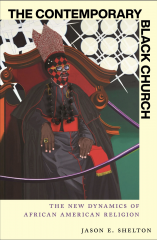 Black Americans have moved from traditional Christian denominations into non-denominational institutions but also to the more open identification of being spiritual but not religious.
Black Americans have moved from traditional Christian denominations into non-denominational institutions but also to the more open identification of being spiritual but not religious.
As this change has happened, the influence of Black preachers has dwindled, as have the community ties once forged in the crucible of ‘the Black Church’ as a singular oppositional body to white racism, Jim Crow, and unfavourable economic conditions.
Jason Shelton's The Contemporary Black Church (New York University Press, 2024) examines how African American religious institutions are evolving through new leadership models, political engagement, and adaptations to social changes while maintaining their historic role in community empowerment.